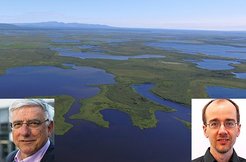ERC Synergy Grant for permafrost research

Photo of arctic research are captured with multicopter (by Martin Heimann), Martin Heimann (copyright Tristan Vostry / Latest Thinking), Mathias Göckede (MPI-BGC)
Arctic permafrost is a critical element in the global climate system, since it stores a vast amount of carbon. This permafrost carbon is at high risk of being released under climate warming as carbon dioxide or methane, both highly important greenhouse gases. The feedbacks between permafrost carbon and climate change are controlled by many factors, including water cycles, forms and features of land surfaces, and living organisms. Shifts in these factors lead to highly complex interactions between biogeochemical and biogeophysical processes, e.g. in soils, vegetation, water and the atmosphere, thus affecting both carbon fluxes and energy exchange. The feedbacks between permafrost carbon and climate change are only rudimentarily represented in current Earth System Models (ESMs), in particular due to a scaling gap between small scale processes and the model grid. To improve this situation, we need better models that are synchronized with customized in-situ and remote sensing datasets across scales, from local to regional to pan-Arctic. The new synergy project will allow the four principal investigators to coordinate their research activities to achieve this ambitious objective.
“Within the Q-ARCTIC project, we will establish a next generation coupled land-surface model that explicitly resolves highest resolution landscape features and disturbance processes in the Arctic”, says principal investigator Dr. Mathias Göckede. The new model will be based on novel remote sensing methodologies that link landscape characteristics and change potential at an exceptional level of detail. For the first time, the required remote sensing information can be produced from new pan-Arctic data streams, such as from the European Sentinel satellites. In addition, interdisciplinary observations at multiple spatiotemporal scales will deliver novel insight into permafrost carbon cycle processes. To this end, breakthroughs in ultraportable instrumentation and mobile air- and water-borne platforms will facilitate to bridge the gap between in-situ local process understanding and landscape-scale surface-atmosphere exchanges.
“Using these essential components we will generate an unprecedented retrospective analysis of glacial permafrost carbon states in the past as well as projections of permafrost sustainability under future scenarios, with a focus on abrupt changes” says Prof. Martin Heimann, second principal investigator from Max Planck Institute for Biogeochemistry
Contact:
Prof. em. Martin Heimann
Max Planck Institute for Biogeochemistry
Phone : +49 (0) 3641 6350
mheimann@bgc-jena.mpg.de
Dr. Mathias Göckede
Max Planck Institute for Biogeochemistry
Department Biogeochemical Signals
Phone : +49 (0) 151 5110 6657
mgoeck@bgc-jena.mpg.de
